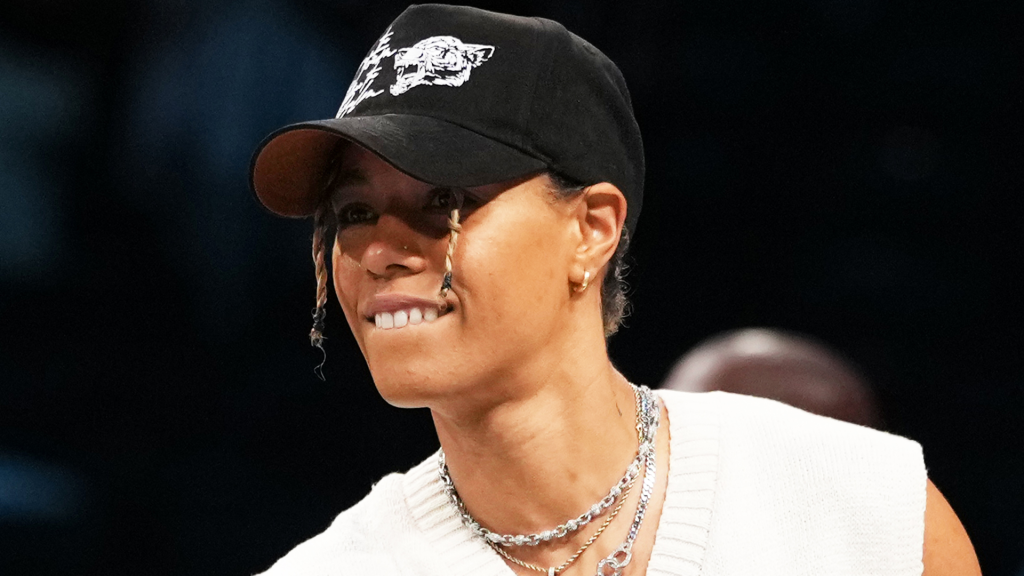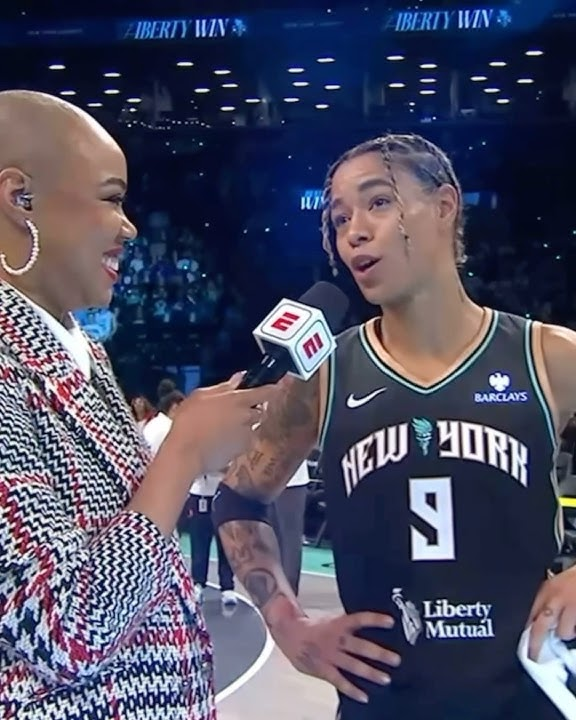“I was faking being straight for years. It was so annoying,” said WNBA star Natasha Cloud on the New York Times “Modern Love” podcast last week—before discussing how she also faked being bi for a while, to appease sponsors. Basketball fans already know Cloud as the star New York Liberty point guard who appropriately wears a no. 9 jersey (get it—cloud nine?). But last week they got to know her on a much deeper level thanks to the podcast, where she chatted with host Anna Martin not just about love, but growing up mixed-race in a white family, and publicly untangling her sexual identity. (Abridged transcript here, if you’re not a podcast fan.)

Cloud opened up about her four-year relationship with teammate Isabelle Harrison, whom she began dating before both started playing for the Liberty. “We were never trying to play together—you hear horror stories about couples on teams,” said Cloud, who was traded to New York after Harrison had already signed with the team. They decided to set clear parameters that would allow them to maintain healthy time away from one another and nurture independent relationships with their teammates. “We’ve been very intentional about approaching this the right way,” Cloud said on the podcast. “We’re ‘Tizzy’ at home and when we travel together, but you get your Tash and Izzy time in the locker room.” To help with that, they schedule different times for things like weight lifting, shooting time, and physical therapy. Cloud said maintaining independence is part of why their relationship works. “This is the first time I’ve experienced having an equal partner who doesn’t need you, but wants you,” she said, noting that while the couple shares a two-bedroom apartment within walking distance to the Barclays Center, Harrison kept her own apartment too, as a place to enjoy some solitude and space.

Cloud also reflected on her upbringing in a predominantly white Philadelphia suburb, where she gradually grew to realize she didn’t really look like everyone else. “I literally am the Black sheep,” Cloud said of how she appeared even amidst her family; she was raised by her white mother and stepfather, with four white half-siblings. She learned at age 12 that she was conceived when her mom had an affair with a Black man, and she didn’t find out her father’s identity until she was a teen. “But I truly never felt different in my family,” she told Martin on the podcast. “I would never have known I was any bit different, because they never treated me any different. It was just, ‘This is sitewhat our family looks like.’”
The basketball powerhouse finally experienced diversity when she arrived at the University of Maryland and found the change incredibly empowering. “I was just engulfed in beautiful Blackness—the track girls, the football guys, the teams around campus. They allowed me to find my Black side and be proud to be a Black woman,” she said. “But I’m also proud to be mixed. I think being a mixed kid is one of the hardest things to be.” She recalled how when she came home from college, it took her family a minute to understand the “New Tash” who had been unleashed.

Most Popular
Once she connected with a new side of her racial identity, she began to explore her sexual identity. “I was faking being straight for years—it was so annoying. I hated it,” she said. She’d had a childhood sweetheart from sixth grade all the way until college, and had always had an appreciation for good-looking men, but her heart wasn’t in it. “I can appreciate men, but all the other stuff that comes with y’all—I can’t,” she laughed. “And I tried. I really tried.” While she had always found women attractive, it took her until her early 20s to consider actually dating them. “I don’t think I was ready to navigate that space until I felt very secure in myself,” she said. That finally happened when she got to the WNBA, where she was surrounded by powerful, outspoken women who were totally unapologetic about who they were. Yet for a few years, she still publicly said she was bi, not gay. “There’s still this pressure to sell to the male demographic and have sex appeal,” she said. By age 24, though, she was done pretending. Once she came out as gay, everything got better—including her skills on the court. “I was like the Hulk who just got superpowers,” she said. “When you hide or suppress a part of yourself, you’re not fully you. You limit yourself in so many ways. If I can’t be confident in who I am as a person, how can I be confident in who I am as a player?”
Cloud also thanked her family for giving her a strong emotional and moral foundation. “In this league, you have families who take advantage of players and use them as a cash cow,” she said. “My family has never taken anything from me. I truly have the best parents in the world, and even my siblings who voted for Trump—I’m like, ‘Y’all irritate my ass,’ but I know that if I ever needed to be defended, they would.” Cloud also recounted how her conservative-leaning family has never made her feel judged. “I never even told my dad I was gay. I literally just brought my girlfriend home, and he was like, ‘It’s nice to meet you,’” she says.
Most Popular
Throughout the podcast, she credited her dad’s unconditional love for helping her become the confident and successful woman she is today. “You have given me a life I couldn’t even have dreamed of, took me in as your own when you didn’t have to,” she said of him. “Navigating a world of men who are not of quality has shown me how rare that is.”
Leave a Reply